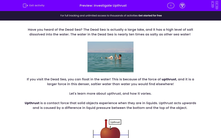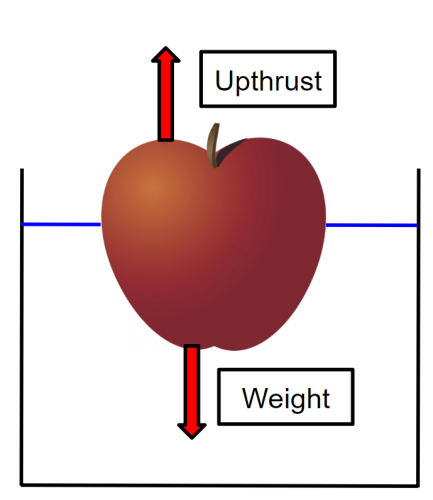Have you heard of the Dead Sea? The Dead Sea is actually a large lake, and it has a high level of salt dissolved into the water. The water in the Dead Sea is nearly ten times as salty as other sea water!

If you visit the Dead Sea, you can float in the water! This is because of the force of upthrust, and it is a larger force in this denser, saltier water than water you would find elsewhere!
Let's learn more about upthrust, and how it varies.
Upthrust is a contact force that solid objects experience when they are in liquids. Upthrust acts upwards and is caused by a difference in liquid pressure between the bottom and the top of the object.
For an object in a liquid, if the upthrust is greater than the weight the object will float. If the weight is greater than the upthrust the object will sink.
What are some of the factors that affect upthrust?
Upthrust depends on two key things - the volume of the object in the liquid, and the density of the liquid.
The greater the volume of the object, the greater the upthrust.
The greater the density of the liquid, the greater the upthrust.
We can carry out simple experiments to investigate the upthrust in different liquids. We will need large beakers, liquids with different densities, a Newton meter, and an object we can lower into the liquid.
If we hang an object from a Newton meter, we can read off its weight in Newtons.
If we submerge the object into water, the reading on the Newton meter changes. The Newton meter will read a smaller force because the upthrust is cancelling out some of the weight of the object.
The difference between the reading before the object is submerged and after it is submerged is equal to the upthrust!
In our experiment, we will be investigating how the upthrust varies for three liquids: water, olive oil and salty water (brine).
The independent variable will be the type of liquid, and the dependent variable will be the difference in force. Below is a table of results.
| Type of Liquid | Newton meter reading before submerging (N) | Newton meter reading after submerging (N) | Difference in force (N) |
|---|---|---|---|
| Water | 4 | 2.8 | 1.2 |
| Brine | 4 | 1.5 | 2.5 |
| Olive oil | 4 | 3.2 | 0.8 |
Which liquid caused the greatest upthrust?
The brine (salty water) caused the most upthrust because the brine caused the biggest difference in force on the Newton meter. The upthrust was 2.5 N.
This means that the olive oil caused the least upthrust, as the difference for the oil was the smallest.
Our results match the rule we mentioned earlier about how the density of a liquid affects the amount of upthrust. Brine is the most dense of our liquids, then water, and then oil is the least dense.
Now that we have seen how we can investigate upthrust, let's try some questions!










